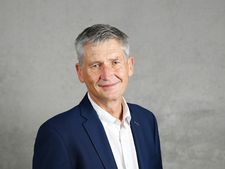-
BASE
subnavigation
BASE
- About us
- Laboratorium
- Career
- Laws and regulations
- Legal Basis
- Manual on Reactor Safety and Radiation Protection
- 1A Nuclear and radiation protection law
- 1B Other laws
- 1C Transport law
- 1D Bilateral agreements
- 1E Multilateral agreements
- 1F EU law
- 2 General administrative provisions
- 3 Announcements of the BMU and the formerly competent BMI
- 4 Relevant provisions and recommendations
- 5 Nuclear Safety Standards Commission (KTA)
- 6 Key committees
- Annex to the NS Handbook
- A 1 English translations of laws and regulations
- Dose coefficients to calculate radiation exposure
- BASE topics in the Bundestag
-
Topics
subnavigation
Topics
Nuclear Safety
Interim Storage / Transport
-
News
subnavigation
BASE President enters retirement
Year of issue 2024
Date 2024.01.31
Date 2024.01.31

![]() Wolfram König, President of the Federal Office for the Safety of Nuclear Waste Management (BASE)
Source: BASE
Wolfram König, President of the Federal Office for the Safety of Nuclear Waste Management (BASE)
Source: BASE
The President of the Federal Office for the Safety of Nuclear Waste Management (BASE), Wolfram König, will be retiring today, 31 January 2024. Wolfram König was the first President to be appointed to the Federal Office on 1 August 2016. BASE, which currently employs around 450 staff, was entrusted with its tasks following the reorganisation of nuclear waste management structures, which König had initiated as a consequence of the second nuclear phase-out. Most notably, operational and supervisory tasks were separated and consolidated.
As BASE President, König set up the first federal supervision of final storage facilities under nuclear law and bundled the licencing tasks for interim storage facilities, transports and final storage facilities, which had previously been divided between the federal and state governments. BASE was also charged with involving the public in the search for a repository site. In the years that followed, it continuously developed and enhanced its information and participation offers in the site selection procedure. "The benchmark was to create an authority with a broad range of expertise that can stand up for the safety of people and the environment in its area of responsibility - regardless of vested interests," emphasises König.
Wolfram König, who already specialised in environmental planning during his studies, was previously President of the Federal Office for Radiation Protection (BfS) from 1999 to 2017, and State Secretary for the Environment in Saxony-Anhalt from 1994 to 1998. As Chairman of the Radar Commission on behalf of the Bundestag's Defence Committee, König managed to secure compensation claims for former members of the Bundeswehr and NVA. His so-called children's cancer study in 2007 revealed an increased incidence of cancer in children in the vicinity of nuclear power plants. Furthermore, the German Mobile Telecommunications Research Programme of BfS was the largest programme of its kind to investigate the possible health effects of mobile phone radiation with the involvement of the public.
Since the turn of the millennium, König has been campaigning for a comparative search for a repository site to deal with the radioactive legacy, which was finally decided upon in 2013. Following a review by the Federal Administrative Court, he commissioned the expansion of the Konrad mine in Salzgitter in 2007 to become the first licenced repository for low- and intermediate-level waste in Germany under nuclear law. In 2009, the BfS was also entrusted with the operation of the contaminated Asse mine, which was transferred from mining law to the stricter nuclear law under his direction. Wolfram König was instrumental both at state and federal level in stopping the storage of West German radioactive waste in the former GDR repository at Morsleben, and in the early stabilisation of the latter. " The long-term safe remediation of environmental pollution in particular has accompanied me throughout my entire professional life. The solution lies in an interdisciplinary approach," says König, who uncovered contaminated sites from the production of explosives during the Third Reich in Hessisch Lichtenau in the 1980s, and developed the scientific basis for its remediation, which was completed in 2010.
Until a repository for high-level radioactive waste is available, the latter must be stored safely in interim storage facilities. Between 2001 and 2003, the BfS, headed by König, carried out a total of 16 licencing procedures for interim storage facilities at the nuclear power plant sites. This created sufficient storage capacity for all high-level radioactive waste ever produced in Germany, and reduced nuclear transports to an absolute minimum. In the wake of 11 September 2001, König decreed that all interim storage facilities should also be checked for targeted aircraft attacks.
Since it became known that the search for a final storage site would take considerably longer than the legislator had envisaged, König has been campaigning for a reliable and transparent timetable. All parties involved should agree on the date by which a final repository can be realised - and must be realised for safety reasons. "Interim storage facilities cannot replace repositories in the long term. We therefore need a repository that permanently protects people and the environment from radioactive waste, and we must not postpone this task to a vague future," said König.
The outgoing BASE President expressed his thanks for the support and critical monitoring of his work in what is probably one of the most challenging and socially controversial areas. “BASE is a strong voice in Germany that has the expertise to tackle the forthcoming challenges in nuclear waste management - I wish the excellent and dedicated staff of BASE and its future management all the best and every success." On the occasion of König's departure, Federal Environment Minister Steffi Lemke thanked him for his "many years of commitment to nuclear safety in Germany". Christian Kühn, previously Parliamentary State Secretary at the BMUV, will succeed Wolfram König as President of the BASE - he will take office on 15 February.
State of 2024.01.31

